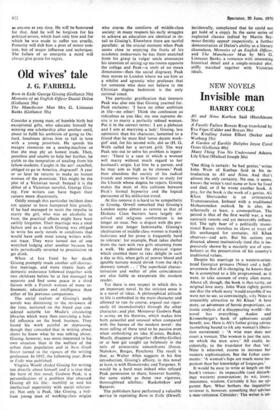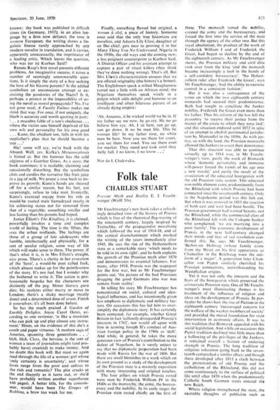NEW NOVELS
Invisible man
BARRY COLE
Ali and Nino Kurban Said (Hutchinson 30s) A Family Failure Renate Rasp translated by Eva Figes (Calder and Boyars 30s) The Kindling Janice Elliott (Seeker and Warburg 35s) A Garden of Earthly Delights Joyce Carol Oates (Gollancz 40s) Many Thing You No Understand Adaora Lily Ulasi (Michael Joseph 30s) `One thing is certain: he had genius,' writes John Wain of Kurban Said in his in- troduction to Ali and Nino. And that's almost the only certainty. No one, it seems, knows the writer's real name or how he lived and died, or if he wrote another book. A pity, for the book is the work of a genius. Ali Khan Shirvanshir is an aristocratic Transcaucasian. Imbued with a traditional Mohammedan outlook he is also, in- tellectually at least, a cosmopolitan. The period is that of the first world war, a war curiously remote and yet inexorably influen- tial. The ugly bear of a politically transi- tional Russia stretches its claws at ways of life unchanged for centuries. Ali Khan observes—and acts. But his actions are directed, almost instinctively (and this is im- pressively shown by a masterly use of sym- bolism) at the preservation of his country's traditional values.
Despite his marriage to a western-orien- tated Georgian princess (Nino) and a half- awareness that all is changing, he knows that he is committed to a life programmed, as it were, to take account of every alien move.
Above all, though, the book is that rarity, an original love story. John Wain rightly points out that the whole story 'would crumble if we were not to see, so convincingly, why Nino is irresistibly attractive to Ali Khan.' A love story, an adventure of heroic proportions, an ironic analysis of a disappearing world—the novel has everything. Auden and Kronenberger's book of aphorisms could benefit, too. Here is Ali's father giving advice (something bound to irk any woman's libera- tion movement) : 'A wise man does not court a woman. The woman is just the acre, on which the man sows.' All credit, in- cidentally, to the translator for that 'on'. Nino is educated, yearns to increase her western sophistication. But the father com- ments: 'A woman's hips are much more im- portant than her knowledge of languages.' It would be easy to write at length on the book's virtues: its impeccable (and disturb- ingy western) construction; its wit, irony, innocence, wisdom: Certainly it has no ap- parent flaw. What bothers the inquisitive
reviewer is, however, something that advises a near-reticence. Consider: The writer is un-
known: the book was published in difficult times (in Germany, 1937); in an alien lan- guage by a firm now defunct; the tone is western European; the writing shows a lin- guistic finesse rarely approached by any modern novelist in translation, and it carries, apparently unnecessarily, the imprimatur of a leading critic. Which leaves the question, who was (or is) Kurban Said?
Renate Rasp's first novel presents different problems. An imaginative success, it raises a number of seemingly unanswerable ques- tions. Is it simply the story of a boy seeking the love of his bizarre parents? Is the addled symbOlism an unconscious attempt at ex- orcising the pandorics of the Nazis? Is it, perhaps, a protest at the impossibility of us- ing the novel as moral propaganda? No, I've not gone mad; A Family Failure makes me think that way. For once, if not uniquely, the blurb is accurate and worth quoting in part: a macabre fable of a son's obedience ... where the victim sees himself deprived of his own will and personality for his own good . . . Kuno, the obedient son, falls in with his stepfather's plan that he should become a tree..: Ha! some will say, we're back with the Absurd. Well, yes. Kafka's Metamorphosis is hinted at. But the humour has the cold edginess of a Gunther Grass. As a story, the book convinces; it is readable, alarming and occasionally disturbing. But the symbolism clots and curdles the narrative like fruit juice in a jug of milk. We prune a rose bush to im- prove its growth; Kuno's hands are sheared off for a similar reason, but his feet, not surprisingly, refuse to take root. Ironically, Kuno's eventual escape from his role as would-be rooted male hamadryad results in his achieving status not far removed from that of a vegetable; something smaller and less lasting than his parents had hoped.
Janice Elliott's The Kindling, it is claimed, powerfully invokes a time and complex work! of feeling. The time is the 'fifties, the area the urban midlands. The feelings are those of a group of late adolescents who fumble, intellectually and physically, for a sort of secular religion, some way of life which will make sense to them. The power, if that's what it is, is in Mrs Elliott's straight, nice prose. There's a clarity in her evocation of the 'hero', a would-be poet called Jack, which almost makes up for the pointlessness of the story. It's not bad, but I wonder why site bothered to write it. The action is pro- fessionally bespoke but the characters are distinctly off the peg. Minor literary guru dies; his acolytes either marry or move to London; there's a shaky marriage (neatly done) and a determined dose of arson. Finish it yourselves; it's all been done before.
So has the much praised A Garden of Earthly Delights. Joyce Carol Oates, ac- cording to one reviewer, 'is like a musician who can pick up and play almost any instru- ment.' Hmm, on the evidence of this she's a comb and paper virtuoso. 'A modern saga of America, spanning three generations . . blab, blab. Clara, the heroine, is the sort of woman a team of journalists might (and pro- bably have) create(d) to make money. And no doubt this book will. But must we again read through the life of a woman/girl whose 'drily certainty is uncertainty', and whose loves range from the poor and callous to the rich and romantic? The plot creaks at the end (happily as it turns out, or she'd have probably written another superfluous 440 pages). A better title, for the connois- seur, would have been The Grapes of Robbins, a brew too weak for me.
Finally, something flawed but original, a roman a clef, a piece of history. Someone once said that the only true historians are novelists, and Adaora Lily Ulasi, daughter of an Ibo chief, gets near to proving it in her Many Thing You No Understand. Nigeria in the 1930s, the old ways and the coming new; a less poignant counterpoint to Kurban Said. A District Officer and his assistant attempt to capture a pair of ritual killers (they think they've done nothing wrong). That's all. But Mrs Ulasi's characterisation ensures that we are offered originality (the history's a bonus). The Englishmen speak a stilted Maughamese tarred not a little with an African mind; the Nigerians themselves speak wisely in a pidgin which adds delight and humour to an intelligent and often hilarious picture of an already dying empire:
`Ah, Amanna, it be wicked world we be in. If my father see me now, he go cry. He no go believe him eye. Ah, I sit here, sun go up, sun go down. it no be man life. This be woman life! In my father time, no white man be here. Now you see them for court, you see them for road. You see them even for market. They stand and look until they belly full. I no know, I no know ..
Nor do I, Chukwuka.



































 Previous page
Previous page